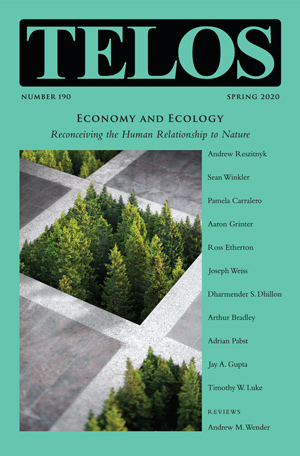In today’s episode of the Telos Press Podcast, David Pan talks with Kyle Baasch about his article “Critical Theory in the Flesh: Adorno and Foucault in San Francisco,” from Telos 196 (Fall 2021). An excerpt of the article appears here. In their conversation they discussed how Foucault’s aversion to Marxism relates to his notion of the individual as endlessly transfiguring itself through acts of creative self-invention; how Adorno interprets the freedom of the subject within the context of consumer culture and exchange society; the influence of Adorno’s experience as a heartbroken lover on his conception of happiness, particularly in Minima Moralia; how Adorno’s notion of happiness relates to the conception of harmony that Foucault criticizes; and the extent to which the two thinkers can be put into conversation. If your university has an online subscription to Telos, you can read the full article at the Telos Online website. For non-subscribers, learn how your university can begin a subscription to Telos at our library recommendation page. Print copies of Telos 196 are available for purchase in our online store.
|
In today’s episode of the Telos Press Podcast, David Pan talks with Lillian Hingley about her article “The Feminine Character: The Allegory of Ibsen’s Women in Adorno’s Modernist Literary Theory” from Telos 196 (Fall 2021). An excerpt of the article appears here. In their conversation they talked about Adorno’s idea of the “feminine character” and how it relates to his broader critique of capitalist society; Adorno’s reasons for focusing on the women of Ibsen’s plays; the ways that Adorno uses the idea of allegory to interpret Ibsen’s work; how Adorno links individual tragedy to more general structures of alienation; and whether Adorno is trying imagine a world without tragedy or, alternatively, if tragedy for Adorno is just a part of human existence. If your university has an online subscription to Telos, you can read the full article at the Telos Online website. For non-subscribers, learn how your university can begin a subscription to Telos at our library recommendation page. Print copies of Telos 196 are available for purchase in our online store. In today’s episode of the Telos Press Podcast, Camelia Raghinaru talks with Justin Neville Kaushall about his article “Natural Spontaneity, or Adorno’s Aesthetic Category of the Shudder,” from Telos 192 (Fall 2020). An excerpt of the article appears here. If your university has an online subscription to Telos, you can read the full article at the Telos Online website. For non-subscribers, learn how your university can begin a subscription to Telos at our library recommendation page. Purchase a print copy of Telos 192 in our online store. In today’s episode of the Telos Press Podcast, Camelia Raghinaru talks with Robert Miner about his article “Human Joy and the Subversion of Work/Play Distinctions: A Note on Adorno’s Minima Moralia 2.84,” from Telos 191 (Summer 2020). An excerpt of the article appears here. If your university has an online subscription to Telos, you can read the full article at the Telos Online website. For non-subscribers, learn how your university can begin a subscription to Telos at our library recommendation page. Purchase a print copy of Telos 191 in our online store. There are conspiracies. Many learned of Catiline, the ideal type of a conspirator, in Latin lessons. But even the memory of Richard Nixon in the Watergate affair suffices. The secret agreements by the powerful in back rooms, the hidden workings of the intelligence services, and all forms of secret diplomacy stir in us the suspicion of conspiracy. As a general rule, we only have knowledge of failed conspiracies. And their failure, as once noted by Machiavelli in his Discorsi, is highly probable, for when more than a handful of people conspire to commit a crime, the danger posed by whistleblowers grows exponentially. Yet it does not naturally follow that conspiracies cannot succeed. We just know nothing about them. The perfect conspiracy remains just as invisible as the perfect murder. |
||||
|
Telos Press Publishing · PO Box 811 · Candor, NY 13743 · Phone: 212-228-6479 Privacy Policy · Data Protection Copyright © 2025 Telos Press Publishing · All Rights Reserved |
||||



